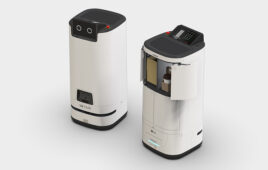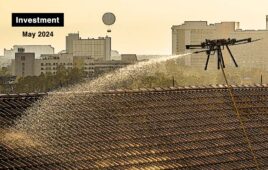|
Listen to this article
|

AMP’s recycling system in the RDS Pitt County Recycling Center will begin processing material in late June. | Source: AMP
AMP Robotics Corp., which recently rebranded to simply “AMP,” has installed one of its advanced recycling systems at the Pitt County Recycling Center in Greenville, N.C. The system will process approximately 10,000 tons of single-stream and commercial recycling annually at the facility.
Recycling and Disposal Solutions of Virginia (RDS) owns and operates the facility. With AMP as its partner, RDS earned a processing contract from Pitt County in July 2023 and purchased the facility. After acquiring the facility, the operator undertook a modernization effort to upgrade it so it could more efficiently process recyclables at a lower cost.
Part of this modernization effort included installing a complete AMP ONE system which includes artificial intelligence for sortation. The companies last week said their the partnership and technology helped preserve recyclable processing in Pitt County. From this facility, RDS can serve the county’s 14 towns and cities, as well as surrounding municipalities.
“We’re proud to expand our relationship with RDS while helping to preserve access to a community recycling program at risk of being shuttered,” stated Matanya Horowitz, founder and CEO of AMP. “High transportation and sorting costs often make recycling unviable in small and rural markets. This project demonstrates how we can profitably open recycling facilities in underserved communities—which is rare in the waste industry.”
RDS bets on a long-term partner
AMP and RDS began working together in 2017. Two years later, RDS purchased its first AI-powered sorting system from AMP. The system went to work in an RDS facility in Roanoke, Va., with the goal of making it safer and more efficient.
“When I first started working with AMP as an operator, I said AI technology is one of the best investments you can make, and if I were starting a new facility, I wouldn’t do it without AMP’s AI,” said Joe Benedetto, president of RDS.
“AMP was flexible in delivering a solution that overcame the limitations of traditional sortation economics,” he added. “AI provides a notable efficiency boost when incorporated into existing facilities, but it’s even more impactful when it’s designed in from the outset—that’s why it’s so powerful to commission a facility with AMP’s technology.”
AMP said its facility designs can scale to match capacity with supply with supply, including software-enabled configuration changes and modular sorting lines. The company claimed this flexibility enables regional diversion strategies that can capture greater amounts of material and lower per-unit capital and operating costs.
AMP rebrands to reflect extended product portfolio
Louisville, Colo.-based AMP was founded nearly a decade ago with the goal of proving that AI, machine learning, and robotics can transform recycling. Since then, the company has deployed hundreds of automated sorting systems across the U.S., Canada, Europe, and Japan.
In February, it dropped the “robotics” from its name. AMP said it plans to focus on creating results for its customers, whether that involves robotics or not.
In recent years, the company has been expanding its product portfolio to include systems for material characterization, film removal and recovery, and compact spaces in materials recovery facilities. All of these technologies have been enabled by AI, according to AMP.
Most recently, it launched a fully automated, facility-scale sortation system, called AMP ONE, for waste management customers such as RDS. The system integrates AMP’s sortation technology into custom or turnkey facilities. The company said it aims to deliver maximum resource recovery with minimal labor and cost.
AMP’s product portfolio includes vision systems for real-time and continuous material characterization, its Delta robotic arm for sortation, the Microjet air-jet sortation for in-stream quality control, and its Vac belt-mounted vacuum sortation for thin film removal.







Tell Us What You Think!